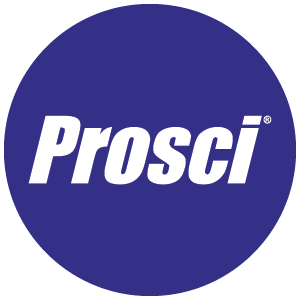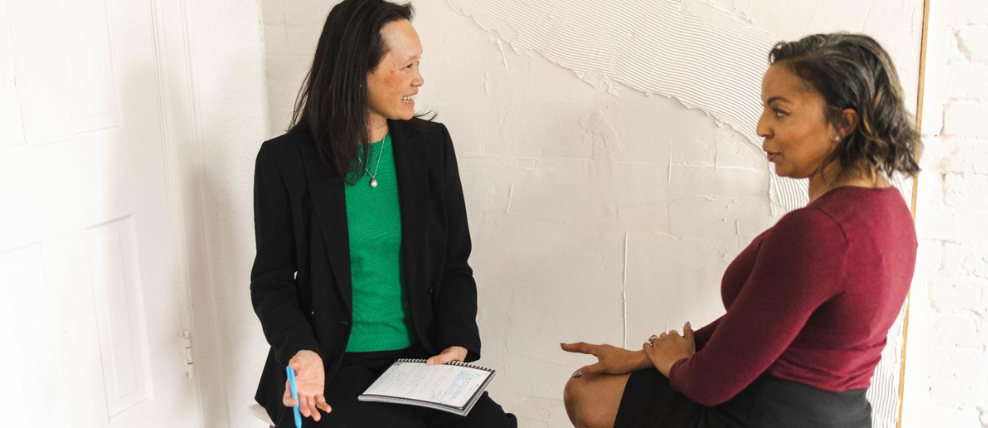18 Change Management Interview Questions and Best Answers

11 Mins
Updated: September 23, 2025
Published: January 9, 2025

According to the Prosci Best Practices in Change Management study benchmarking study, 49% of organizations have change management roles in place.
To find the best candidates for these positions, hiring managers must understand change management and its different roles. Certifications and experience can help shortlist candidates, but targeted interview questions allow you to identify the best ones.
That’s why your change management interview questions must be specific to the role and tailored to find the most relevant information about each candidate.
In this article, we provide 18 interview questions for change management roles, along with what to look for in candidates' answers. Let’s begin with why change management is so crucial and the primary roles you might be hiring for.
The Importance of Change Management
Change management is a structured approach to preparing, equipping and supporting individuals through organizational change. It focuses on the people side of change to ensure that individuals can effectively adopt and use new processes, systems or behaviors, ultimately leading to successful outcomes for the organization.
Research shows that excellent change management can increase the likelihood of success with initiatives while aligning organizational practices with strategic goals.
A proven effective organizational change management approach, like the Prosci Methodology, engages all impacted individuals and motivates them to participate in the change. The approach should also prevent resistance, rather than merely reacting to it. Doing so leads to a smoother transition where people effectively adapt to changes like market shifts, process changes, new technologies, and more.
For example, Prosci research shows that 65% of projects with excellent change management stayed on or ahead of schedule, compared to just 14% of those with poor change management. Effective change management also increases the chances of meeting project outcomes by seven times.
Correlation of Staying On or Ahead of Schedule

Hiring for Different Change Management Roles
The interview questions you use will vary depending on the change management role you're hiring for. These roles can be divided into three broad categories:
- Specialist – The change practitioner or specialist implements change initiatives and projects. They have in-depth expertise in change management models, frameworks and tools, practical experience, and soft skills, including flexibility, agility and problem-solving.
- Manager/Director – A change manager or head of change management oversees teams of practitioners or the entire change management function within the organization. This individual must have strong leadership and analytical skills.
- Deployment Lead – A change deployment lead is responsible for building an organization's change management capabilities. They guide the development of change management as a core competency within the organization. Candidates for this role are highly experienced, strong leaders and valuable decision-makers.
You can learn more about these roles and the essential skills they require using our Change Management Career Guide. In-depth knowledge about each role gives you a better idea of what to look for in your change management interview candidates and helps you more accurately assess their answers.
Change Management Interview Questions
Once you create a shortlist of interview candidates, you can use the following questions to delve into their proficiencies and expertise. We divided the questions into three categories to align them with each of the primary change practitioner types. Our list also includes three vital behavioral questions to round out the interview process.

To help you better judge each candidate's skills, we also explain what each question tests and crucial elements to look for in their answers.
Interview questions for Change Management Specialist
Interviewing for a practitioner or specialist position requires questions that explore their understanding of change management frameworks and the practical aspects of applying them.
Here are five organizational change management interview questions designed specifically for hiring a change specialist:
1. What change management methodologies are you most familiar with, and how have you applied one of them in a past project?
This question tests the candidate's knowledge of established change management models and methodologies, like the Prosci Methodology, and their practical application in real-world scenarios.
Candidates must be able to explain how they used a model during a change project, either individually or as part of a change team. For example, they can outline the Prosci 3-Phase Process and how they used it to design a change process.
2. How do you ensure stakeholder engagement throughout the change process?
A stakeholder is anybody directly impacted by the change. This question aims to understand the candidate's strategies for keeping all relevant parties informed and involved, and ensuring their support.
Candidates must be able to list strategies for employee and sponsor engagement and models for individual change, like the Prosci ADKAR® Model. Here are some of the strategies they should mention:
- Engaging stakeholders, sponsors, and employees early in the process to clarify expectations and roles
- Involving impacted individuals to foster a sense of ownership and commitment
- Developing a comprehensive communication plan with timely updates to build support
- Using diverse communication channels, including virtual platforms, to reach all stakeholders
- Hosting workshops and engagement activities to empower stakeholders and encourage participation
- Ensuring visible and active leadership participation to reinforce the importance of the change
- Preventing resistance by proactively identifying and removing barriers to adoption and implementing other preventative measures
- Communicating how the change benefits stakeholders at all levels to increase their engagement and support
3. What techniques do you use to assess the readiness of an organization for change?
Change readiness is the level to which an organization is prepared, willing and able to implement change. The answer will reveal the candidate's approach to evaluating and preparing an organization before implementing significant changes.
Here are some ways candidates can define a business's change readiness:
- Using written assessments and surveys to gather information on the organization's readiness
- Conducting a stakeholder analysis to understand the level of support and engagement from key decision-makers and impacted groups
- Holding interviews with senior leaders, people managers, and end users to gauge their readiness and gather insights on potential obstacles
- Performing a gap analysis to identify the difference between current capabilities and those needed for successful change
4. Describe how you manage communication across multiple levels of an organization during a change initiative.
Effective communication skills are crucial for a change management professional. This question explores the candidate's interpersonal skills and evaluates their understanding of the specialized approaches to communication necessary during a change project or initiative.
Look for interviewees to mention creating a comprehensive communications plan that includes diverse channels and consistent messaging, as well as using resources that align their approach with change management best practices, like the Communication Checklist.
They should be leveraging preferred senders like people managers, fostering two-way communication through feedback mechanisms, and aligning communications with organizational culture. They should also talk about performing regular assessments, adapting communications strategies, and ensuring they answer the question "What's in it for me?" for each audience.
5. How do you stay updated with new developments and theories in change management?
The answer provides insight into the candidate's commitment to professional development and passion for staying current in their field.
Resources for regular updates on the latest developments in change management include popular industry blogs, webinars, podcasts and social media channels. Networking with peers, seeking mentorship and using technology, such as Kaiya™, Prosci's expert change management AI tool, are also good ways for a change professional to keep their knowledge up to date.
Interview questions for Change Management Manager
When interviewing candidates for positions like Change Manager, Head of Change Management, Director of Change Management, or Change Management Lead, it's important to ask questions that probe their leadership skills and hands-on experience overseeing change initiatives. Our change management job description has more information about this position.
Here are five interview questions for this role:
1. How do you develop and communicate a clear vision for change across an organization?
This question assesses the candidate's ability to articulate and share a compelling vision, which will help them obtain the required commitment and resources to drive positive outcomes.
To do this, a change leader must be proficient in communication strategies and change management models for alignment, like the PCT Model. They must know how to implement these tactics to align all key stakeholders.
Prosci Change Triangle (PCT) Model

Look for the interviewee to describe their approach to creating a vision that resonates with diverse audiences within the organization. They should emphasize the importance of clarity and consistency in messaging, leveraging storytelling to connect emotionally with stakeholders.
The candidate should also highlight their ability to engage leaders at all levels to champion the vision and facilitate two-way communication, ensuring that feedback is incorporated to refine the vision and maintain alignment. This demonstrates their capability to drive engagement and commitment across the organization.
2. What is your approach to building and leading a change management team?
This question assesses candidates' leadership skills and strategies for assembling and motivating a team that manages change.
There are five core roles in change management—change practitioners, sponsors, people managers, project managers and people (impacted employees). The potential change manager should give examples of tactics to keep each of these core roles engaged and get them involved in the change.
Here are some of the things to look for in the candidates’ answers:
- Outlining a People Manager Plan to help managers fulfill their CLARC roles effectively and enable successful implementation
- Defining roles within the team
- Emphasizing the importance of transparent communication channels and collaborative practices
- Demonstrating an understanding of the need to be flexible in their leadership approach, accommodating different team dynamics and project requirements
3. How do you assess and manage the risks associated with a change management project?
Understanding a candidate's risk management strategies reveals their capacity to foresee and mitigate potential challenges for a smooth transition.
An experienced change management manager should conduct a comprehensive risk assessment to identify high-risk factors related to Change Characteristics and Organizational Attributes. They may talk about using risk assessment tools, like the Risk Grid, to identify issues.
Prosci Risk Grid

They should also talk about prioritizing these risks by their impact and how to develop mitigation strategies for the top risks.
4. What strategies do you implement to deal with change saturation within an organization?
Change saturation occurs when organizations launch many change initiatives in a short time and leadership fails to plan appropriately for all of them. This can lead to poor adoption, change fatigue and increased employee turnover.
In our Best Practices in Change Management study, 75% of participants identified their organization as being near, at or past the point of saturation, so the question is highly relevant for any change leader.
A proficient change leader must manage change saturation. For example, they can create a Change Management Portfolio to efficiently prioritize and streamline changes. They should talk about enhancing communication efforts to clarify the change roadmap, as well as adjusting the change portfolio by limiting simultaneous changes and modifying project timelines. This should demonstrate their ability to manage resource distribution and minimize impacts on people.
5. What methods do you use to ensure sustained adoption of new changes within the organization?
In change management, sustainment aims to ingrain new working methods into the organization's culture. This prevents rework and reverting to old systems or processes after the initial implementation.
Sustainment is also crucial to realizing the full benefits of a change initiative instead of partial results.
Sustainment in Change Management

A change manager works with leaders and internal teams to plan for and implement reinforcement activities. The candidate should outline how they plan to reinforce a change, including feedback, rewards, performance metrics, and additional training programs to address gaps.
Interview questions for Change Management Deployment Lead
When interviewing a Change Management Deployment Lead, the questions often focus on leadership, analytical thinking, interpersonal skills, and experiences deploying initiatives to develop change capability.
Here are five job interview questions tailored to a Change Management Deployment Lead role:
1. What approach do you take to assess an organization’s current change management maturity? How do you identify areas for improvement?
This question explores the candidate's ability to evaluate and diagnose an organization's existing change management practices and plan for improvements.
When assessing an organization's current change management maturity, candidates should describe using models like the Prosci Change Management Maturity Model, which helps assess businesses and plan for the future.
Prosci Change Management Maturity Model

To identify areas for improvement, they should discuss analyzing the audit results to pinpoint specific gaps in each capability area. This might involve looking at leadership commitment, the application of change management practices, and the extent of standardization and socialization across the organization.
The candidate should emphasize setting clear targets for improvement and developing a strategic plan to advance the organization's change management maturity, ensuring alignment with organizational goals and fostering a culture of continuous improvement.
2. How have you developed or improved the change management capabilities within an organization?
This question seeks to understand the candidate's experience building or enhancing an organization's ability to effectively manage and adapt to change.
Candidates can illustrate their experience by discussing case studies and testimonials from previous projects.
When evaluating a candidate's experience in developing or improving change management capabilities within an organization, look for their ability to demonstrate a strategic and structured approach.
They should describe using frameworks like the Prosci Change Management Maturity Model to assess current capabilities and identify areas for improvement. Look for examples where they have successfully built organizational change management competencies, possibly through training programs, standardization of methodologies, and integration of change management into the organization's culture and processes.
3. How do you ensure that change management skills are embedded across the organization and not just within the change management team?
The answer to this question will indicate the candidate's strategies for widespread capability development, ensuring that change management is not siloed but integrated throughout the organization.
An experienced deployment lead can detail actions to develop the five primary capability areas: Leadership, Application, Competencies, Standardization and Socialization. For example, discussing the most important aspects of change impact in detail with their team can help build application capability.
In addition to detailing actions for the five primary capability areas, an effective candidate should emphasize the importance of creating a culture that values and understands change management. They might discuss implementing training programs that reach all levels of the organization, from executives to front-line employees, ensuring everyone has the knowledge and skills to manage change effectively.
4. What challenges have you faced when building change capability within an organization and how did you overcome them?
This question will help the interviewer understand how candidates overcome challenges faced during implementation and provide insight into the candidate's problem-solving skills and resilience.
Addressing resistance to change effectively is a common challenge for most practitioners and change leaders. An expert deployment lead will understand that resistance behaviors are a natural reaction primarily driven by a lack of awareness about why the change is needed. The candidate should describe how they prevent resistance, instead of merely responding to resistance behaviors, by implementing structured approaches like the Prosci ADKAR Model and Prosci Methodology.
5. What role do you believe technology plays in enhancing organizational change capability? Have you implemented any technological tools to support this?
Change professionals are no exception to the 63% of executives who believe they will lose competitiveness if they don't embrace the ongoing tech revolution—driven by emerging technologies like AI (artificial intelligence).
Candidates should discuss:
- Integration – Using technology to integrate change management into organizational processes.
- Data-Driven Insights Leveraging analytics for informed decision-making and tracking progress.
- Communication – Facilitating stakeholder engagement and alignment through digital tools.
- Training – Implementing eLearning for widespread competency development.
Candidates should provide examples of technological tools they've implemented and their impact on enhancing change capabilities. They should be proficient in the latest tools, such as Kaiya, and be able to use them to improve change management efficiency.
In addition to role-specific questions, you can assess how well a candidate handled changes in previous roles by asking behavioral questions.
These questions are particularly effective for revealing where the candidate may lack experience or excel at implementing approaches in real-world situations.
Let’s look at the change management behavioral interview questions:
1. Can you give an example of a change initiative that did not go as planned? What challenges did you face and how did you respond?
This question evaluates the candidate's resilience and adaptability, providing insight into how they handle setbacks and challenges.
Common challenges during a change initiative include people having a lack of awareness about the reasons for the change and its benefits, ineffective sponsorship, delayed project implementation, and poor communication that creates barriers to effective adoption.
Many of these challenges are a consequence of starting change management late. An experienced change practitioner must know the strategies to deal with these setbacks using tactics like:
- Conducting risk and impact assessments to modify the change approach.
- Activating primary sponsors and creating a sponsor coalition to perform activities to support the change.
- Using the ADKAR Blueprint to identify the biggest gaps in the ADKAR elements and recommend actions to fix them.
- Drafting key communication messages and educating the sponsor coalition to deliver them.
- Implementing additional activities to improve communication, like frequent town halls, regular project updates, and scheduled time for more open discussions.
- Aligning change management and project management activities to complete the initiative by extending the project timeline, condensing or rearranging change activities, or eliminating some tasks.
Look for candidates with expertise in the practical application of these tactics and the soft skills to deal with delays and significant gaps between planning and implementation. They should be able to provide examples of scenarios when they have successfully gotten a change initiative back on track.
2. Have you ever had to accelerate a change process due to external pressures (e.g., market changes, legal requirements)? Describe the situation and how you adapted your strategy.
This question explores the candidate's ability to react quickly and modify plans effectively under pressure. To deal with crisis-related situations, the right change practitioner candidate must have a reliable and adaptable approach that can help employees adopt changes effectively.
When there’s no time to prepare, support and equip employees for the transition, an expert change professional can use highly responsive change management activities and concepts like Adaptive Actions. Adaptive Actions help practitioners ideate, implement and learn on the go during a crisis.
By combining Adaptive Actions with elements of our ADKAR Model, change professionals can quickly adapt their strategies during a crisis and get positive outcomes.
The ideal candidate clearly articulates how an external pressure impacted the organization, lists the specific adjustments they made to the change strategy, how they identified and managed risks, and what the outcomes of the accelerated process were.
3. Give an example of how you've handled a situation where multiple change projects conflicted with each other. How did you prioritize?
This question provides insights into the candidate's project management skills and approach to prioritization and conflict resolution.
This question ties back to change saturation and how a change professional can use a portfolio to help prioritize projects. They can also use other strategies for reducing change saturation, such as regular meetings with impacted individuals to gauge the level of saturation.
A hiring manager should look for these key elements that demonstrate the candidate's ability to manage complexity effectively:
- They follow a structured method for assessing the situation. Look for mention of specific techniques or criteria used to evaluate the importance and urgency of each project.
- They’re good decision-makers and can explain how they gathered relevant information, consulted with key stakeholders, and made informed decisions.
- They can reflect on what went well and what could have been improved.
Use Prosci Change Management Interview Questions for Hiring
Interview questions for change management help hiring managers find change professionals whose expertise and experience outperform their peers. They enable you to look past resumes and verify a candidate's skills and past work. Our change management interviews are specifically designed for three primary change management roles so you can find the best fit for each one.





